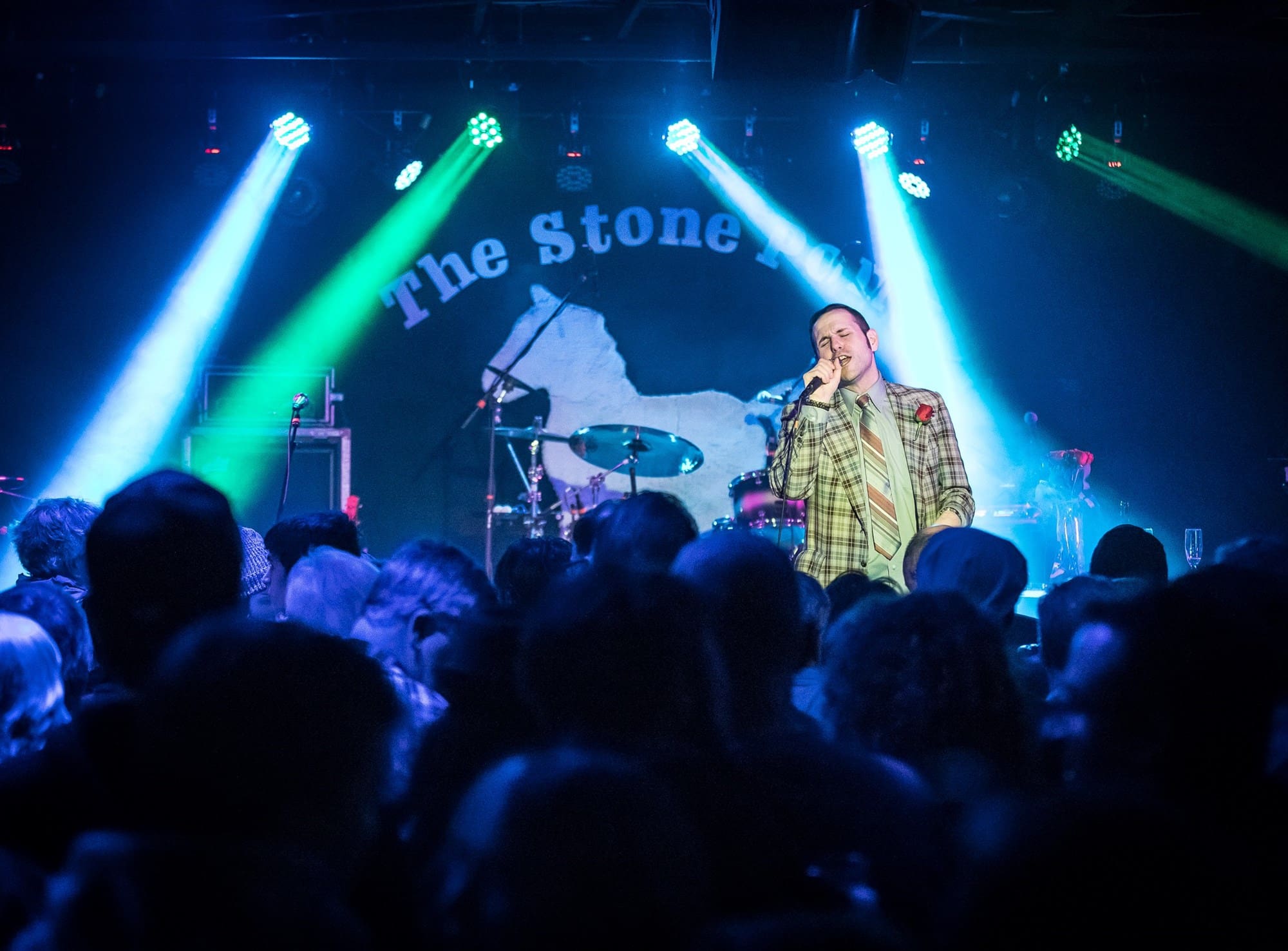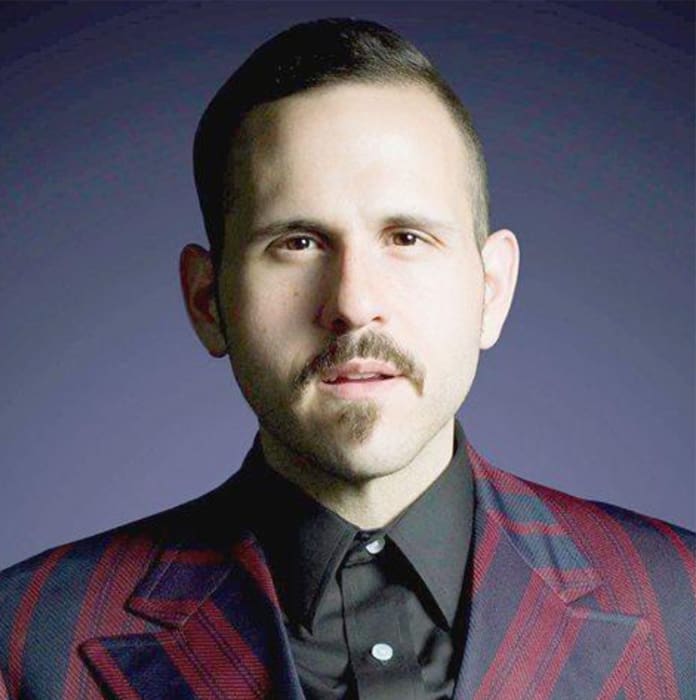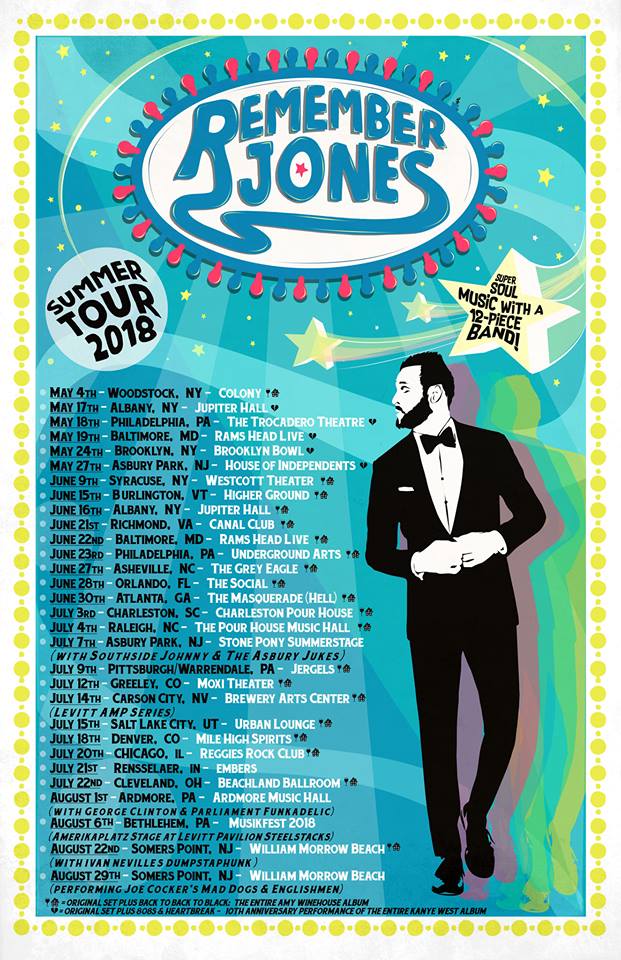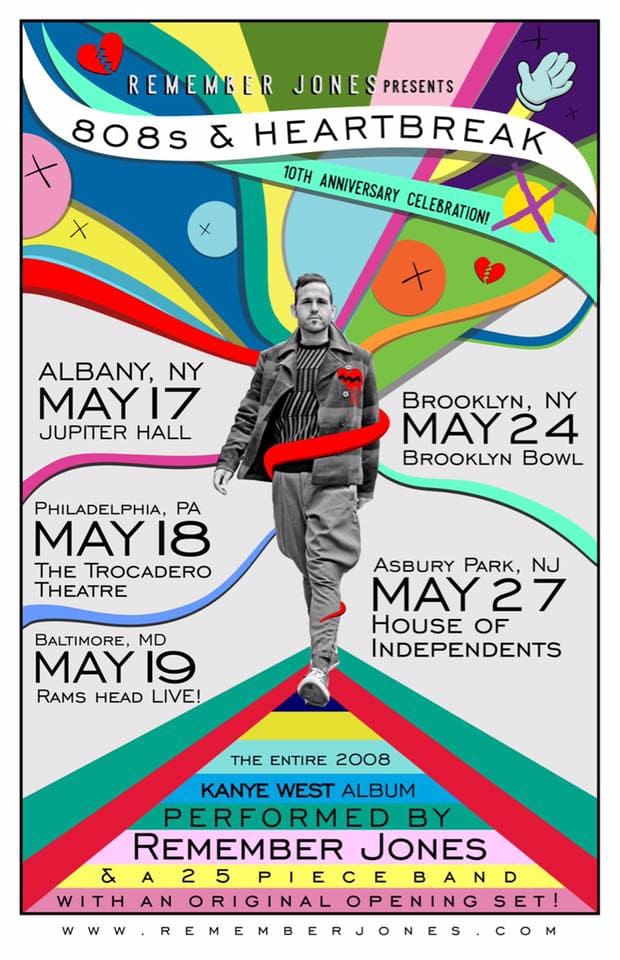It’d easy to peg Remember Jones as cover band. It’d also would be lazy and short-sighted.
Remember Jones isn’t a cover band, or a tribute act — like the innumerable sea of bands that currently occupy the bars, clubs, and venue the entire state of New Jersey. Remember Jones is a revival. It’s retelling, a recreation, and rebirth of original works. It’s the brainchild of Anthony D’Amato, and his army of season songwriters, singers, and musicians from the Asbury Park scene in beyond. In a short period of time this band has gone from playing the original Asbury Lanes to selling out Brooklyn Bowl on a weekday, and touring the entire country. It’s the groups unique spin — through its orchestration, pageantry, and ingenuity that have made it a nationwide success with a future that is blindingly bright.
The group’s latest project is their revival of Kanye West’s 808s & Heartbreak. The divisive, and career re-defining album for Kanye turns 10 this year. To celebrate, the Remember Jones crew is putting their unique spin on it — taking a 12 piece orchestra on the road around the country and showing audiences their version of the record. This Sunday, however, the group will slide into House of Independents in Asbury Park with a 25 piece orchestra for a massive Memorial Day show.
Recently, we caught up with the band’s frontman, singer, and creator Anthony D’Amato to talk about the inspiration behind this latest endeavor for the band, his thoughts on Kanye the musician vs. Kanye the social media presence, and just how on earth he comes up with his ideas.
Remember Jones will be performing Kanye West’s 808s & Heartbreak around the country this summer. Can you talk about the decision on why this record, one of Kayne’s most divisive, was the one you wanted to cover?
I always envisioned myself [performing this record] with a group of people. When I first heard this record, I put it on loop. As a fan of Kayne already, for me, it was huge. I’m a theatrical sort of guy and my performances tap a lot of emotions and feelings. I thought that’s what this particular album did for Kanye West. It also took his career in a new direction. A lot of diehards didn’t really only understand what was going on, but it brought a whole bunch of new fans, musicians in particular, into the game. So I always saw this as something that should be done live.
This isn’t out of place from what we’ve done in the past. We did Trapped in the Closet with an orchestra. We did Now! That’s What I Call Music with an orchestra. So the pop or modern pop thing has always been a part of my life as well as the throwback stuff. When people see this show, they’ll see it it’s in line with what we’ve done.
Will you be rapping, or are you reinterpreting the entire record into your style?
It’s a little bit of both. It’s like what we did with Back to Back to Black, and the Joe Cocker stuff. There’s some twists and turns. That’s why I tend to call our shows a revival of an album, or a recreation of it. With this album in particular, there’s a lot of singing. There’s only two or three songs where it’s just a rap, and even with that it’s rap with a melody. The cool part of this show that separates me from Kayne West is that I’m actually singing as opposed to autotune. It’s the first time I’m using a vocal processor, however.
Can you explain what a vocal processor is?
You know how a lot of guitarists, and keyboard players play through different patches or pedals? They’ll hit the pedal and it’ll create a different tone or a different sound while they’re still playing the same way. A vocal processor is that for a vocalist. I’ve programmed different sounds in, so I’ll be singing the same way, but it sounds different to the audience.
Cher made that popular with “Do You Believe in Life After Love” — which is autotuned and almost makes her sound like a robot. Kanye, especially with 808s & Heartbreak, made that mainstream and popular. We heard it all over hip hop, and then pop music after that. So this album is groundbreaking in some ways. So many musicians and singers want to hate that sound, but it is used in studios a lot because it’s hard sometimes to get vocals in tune with all the electronic instruments. The singing through a processor will tune it and give it that clean, pristine sound.
So for someone like Kanye West, who isn’t a vocalist, it allowed him to sing notes he probably couldn’t do, or create these melodies he probably couldn’t naturally do. It sounds so cool on the record. For me, the processor is an instrument.
Going back to 808s & Heartbreak — what was it that struck you about this? I mean to put this much effort into reviving it, it must’ve meant a lot to you.
To hear Kanye West’s work with an orchestra behind him, classic choir, arrangements, and song lengths that were non-traditional — I really appreciated that. I appreciated the musicianship more than I had before. We all knew and loved the pop hits, and the samples — that was legendary.
This was a direct reflection of what was going on in his life — his mother had just died, he gone through a break-up. He basically was making a record, and didn’t care what anyone else thought. I heard the authenticity of it, and I really liked it. This was a sidestep for him, because the next record (and forward) he went really experimental. Here, he pushed the sound of hip-hop forward. People want to argue the politics of Kanye West, but as musician I would never not say this guy isn’t talented, or is a great producer, or a creative mind.
Do you think because of his recent social media postings that people have forgotten about Kanye West the musician with all his talents, and just think of him as someone who says controversial things online?
Definitely. I get it. I think he’s very smart in a lot of ways, and is freely speaking. It gets him into trouble. But none of that would make me say let me burn his music, or forget about him. The musicianship is different than the politics the person. Look at Bruce Springsteen. People don’t want to listen to him because he’s liberal.
[Back to Kanye] because of his hubris people tend to write him off and say ‘You’re not a genius, you’re crazy, and I’m not going to listen to you.’ I’ve been digging deeper into his work, and I think there’s something coming from this — a project of some sort that is very Kanye West. Obviously he’s got records coming out so this all promotion. I dug deeper into his catalog, and it’s super cool to hear his progress, and this one could be a big turning point like 808s was.
One thing that I admire about Remember Jones is how much planning goes into each artist you tackle. It’s not just a cover band showing up and playing songs. There’s a lot more to it than that. Can you take us inside your head when it comes to why you do what you do?
There’s a lot going on (laughs). The work is everything, it’s everything until you get on stage that’s the fun part. Scheduling everyone is really crazy. I like lush. I like big. But that’s always been music to me. Even the classic soul records, and old rock sounds were very theatrical and large sounding to me. Of course ,I have a theater background. Everything on any Broadway or show recording has a lot of instrumentation. I love film scores, and these sounds that tug at emotions.
People like to feel something whether it’s a four-piece or 20-piece band. So putting on a show is my instrument. It’s what I do better than singing. It’s more natural — connecting with an audience, and changing the feeling in the room. I love to see a lot of things going on. 25 pieces is a selling point. If you think of something like Trapped in the Closet…you’re listening to an orchestra, no matter how ridiculous that might sound. To be able to do it authentically, it needs all those sounds. For example, like Trapped in the Closet, it’s a spectacle. Even with the Amy Winehouse stuff, we’ve done it on the road is huge.. People don’t get a chance to see music like this. People aren’t taking risks like this much anymore. People flock to see these experiences with a large number of musicians. It’s all about the audience to musician connection. I would love for people to share the feelings I feel when I hear the record.
Is there a lot of rewriting, re-arranging going on when you do a revival of an album?
I always say to the people I work with, “The audience knows this music better than you do. So you have to come into this prepared to play what they expect.” However, there’s nothing they like more than you taking them on a confident ride in what is already structured. That’s why we enjoy improv, and sketch comedy. It’s here’s your beginning, middle and end — if you’re confident and then you can do your own thing, you have power. That’s where we start — let’s it get all down. Then based on the work we do, and all the studying we do, we figure out some new things.
For 808s, I approached General Roshane (Karunaratne), to be the musical director. We listened to the record. We listened to a lot of live versions of the songs. And we listened to a lot of interviews to discover the inspiration for the songs, as well as how the songs are built. We put together our own skeleton for 808s. Then Roshane and I talked about the instrumentation for the songs. Then he arranges it, and transcribes — which is his strength. Once we heard everything with the entire then we made changes and edits. We made demos of the songs in our own vision, and then work from there.
Taking the show on the road…how do you make this work? Keeping 12 people motivated to play around the country doesn’t seem like an easy task.
The easy way to sell this show is to call it a tribute, but it’s really not. We’re doing our own performance. It’s like a theatrical revival — it’s the same show but with a new director, cast, and music. It’s what we’re doing. And it’s been working. Everyone understands that in just two years it’s grown tremendously. We’re playing 1,000 cap rooms around the country, and selling out venues in cities we’ve never been to. I think that’s a good way to keep people together. That’s one way to keep motivated.
The other part is for the project to be collaborative. The goal for me, always, is to tour. I don’t need to be rich; I want to perform in front of people all the time. I want to be able to do this non-stop, take a break when voice stops, and then pick it right back up again. It’s easy for us as a collaborative group, that does well in this scene, to stay in this scene. It’s very important for me to use this scene as an experimental zone, and see what sticks and take it on the road. And I think people see that. That there is an ambition, there is a drive. I’m working full-time on this to figure out how everyone can work full-time on this. I think that keeps the group together.
The band has new original music coming out soon. Is there ever a concern that people don’t care as much about the originals as they do the revival material?
It’s something I think about. When we hit year 10 and it’s a problem, I’ll be really concerned. I think what’s happening while we play live, and collaborate on different material is that we’re learning about each other as musicians better. I really like the band — we all have different backgrounds — so I’ll come in with the structure of a song, and they’ll add things to it, or take it in a direction that I never imagined. I’m hoping that we had these singles that people want to write about it.
To keep this as a brand going is important. Songwriters from many reputable bands want to work with us, and it’s very cool. We made an EP last year, that we recorded with Nashville, was written by one of my favorite songwriters ever, Van Hunt. He wrote it thinking about us. It was a huge honor. I feel like very soon, we’re going to have some of these original tunes that people are really going to be talking about, and it’s going get us some attention.
Also, at our shows we’re selling hundreds of dollars of our original merchandise and not anything associated with the cover/revival shows we’re doing.

You have the next project in your head?
Oh man, so many! I’ve got a list. We’re getting commissions…like we recently did one for Jeff Buckley. We’d like to try do Jagged Little Pill again. I want to make this a production company where at any time we could be at a performing arts center or venue, club, or festival and have shows in our pockets. This summer we’re doing Hair, the whole show, with the whole band, and a cast. There’s going to be guests, and members of the original cast. There’s a couple more in the pocket…some I’d like to do just for fun, but we’ll see. The original music for 2019 is definitely a thing.




